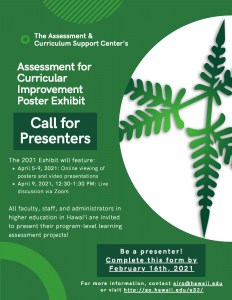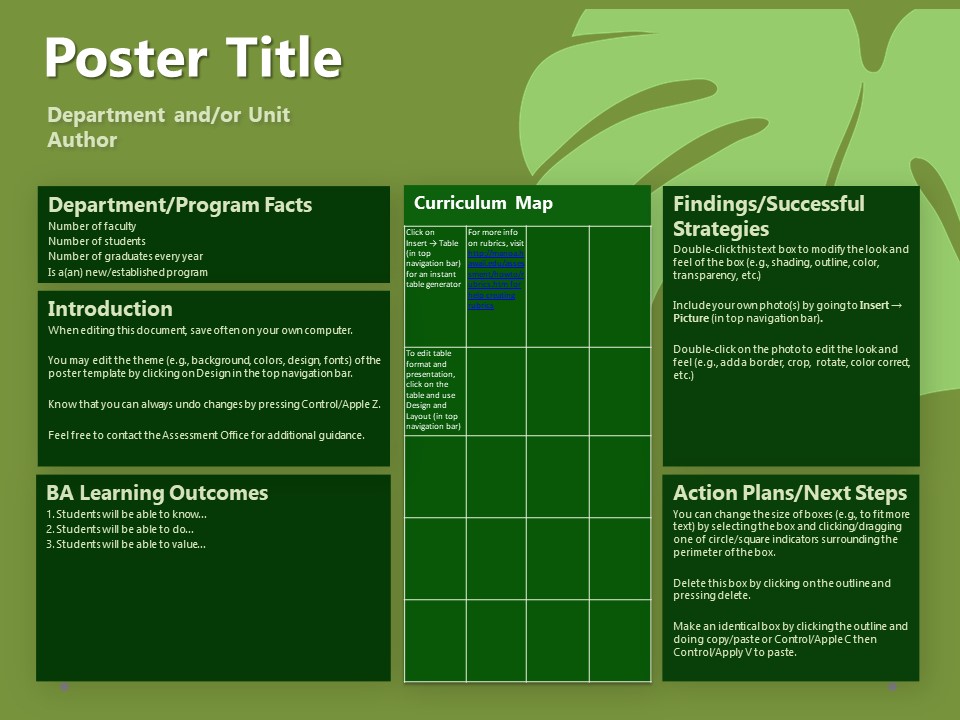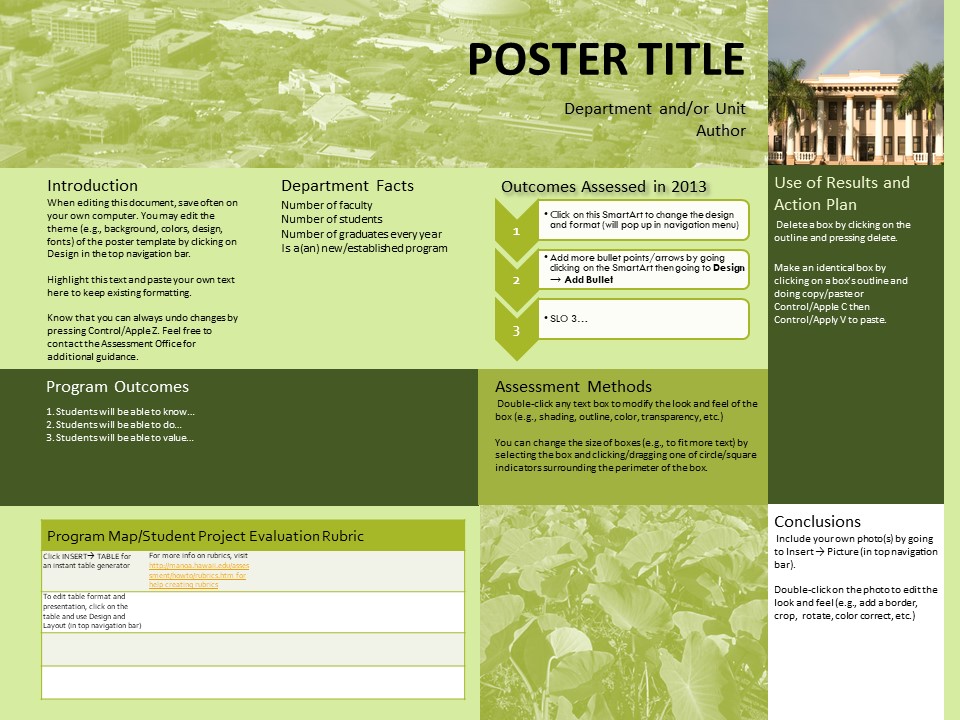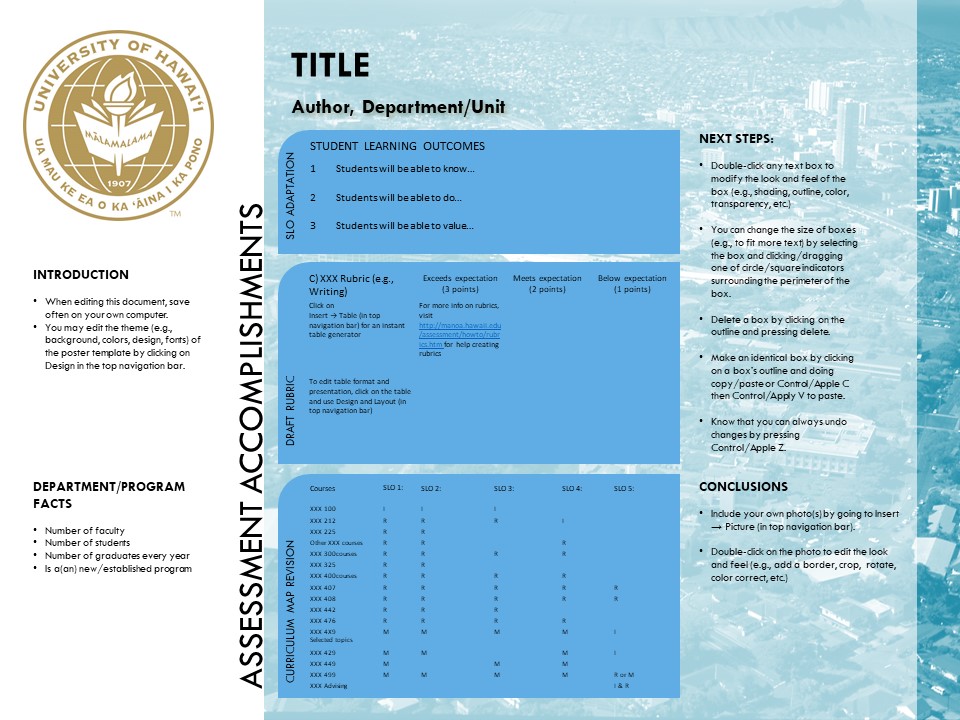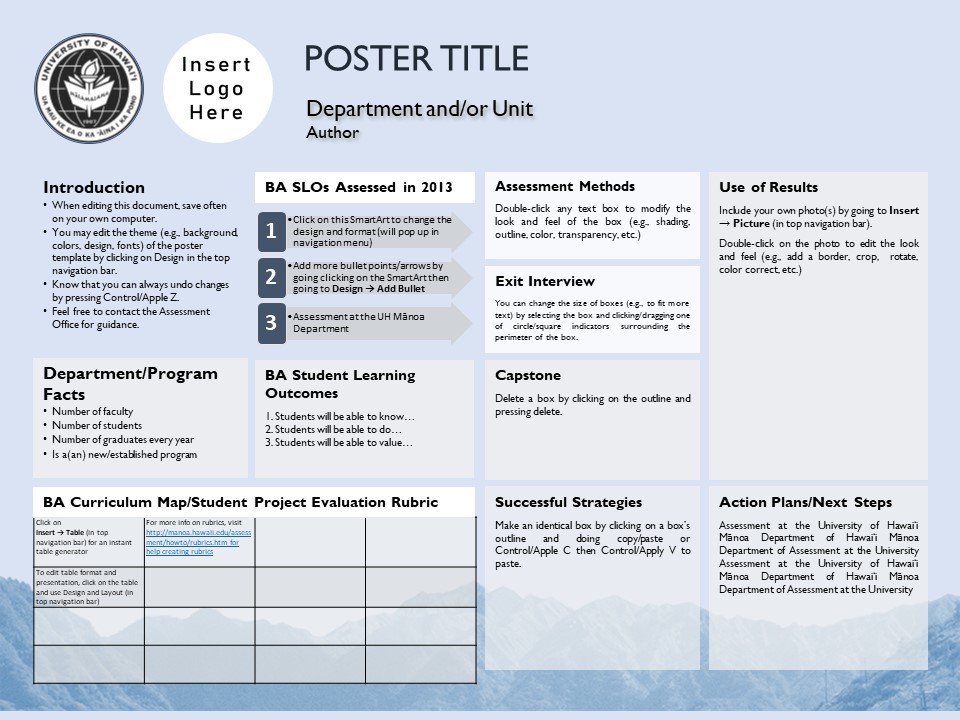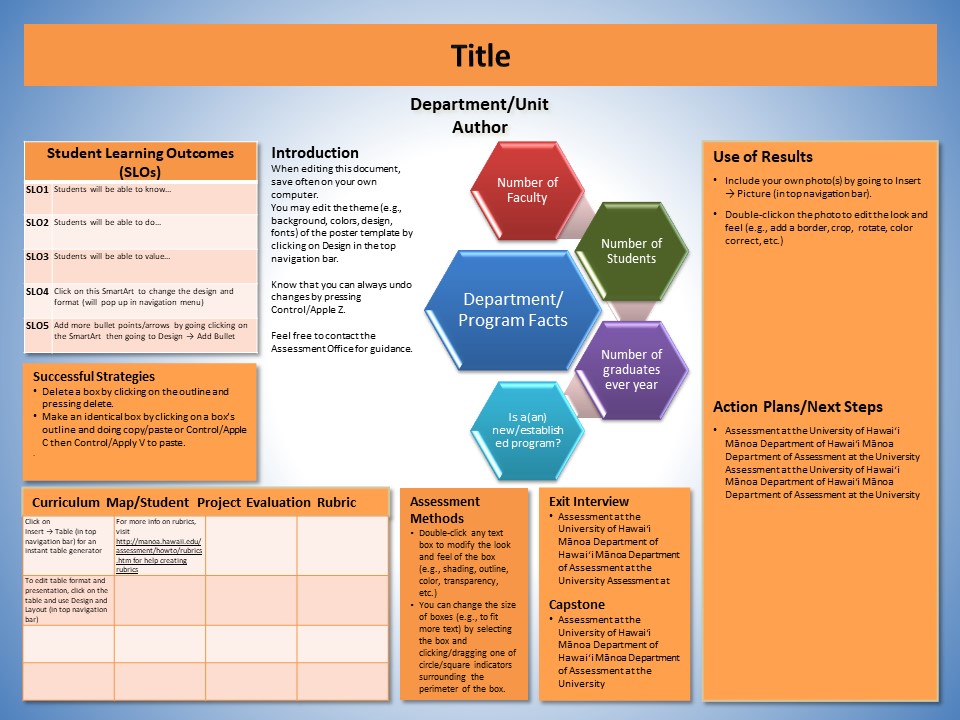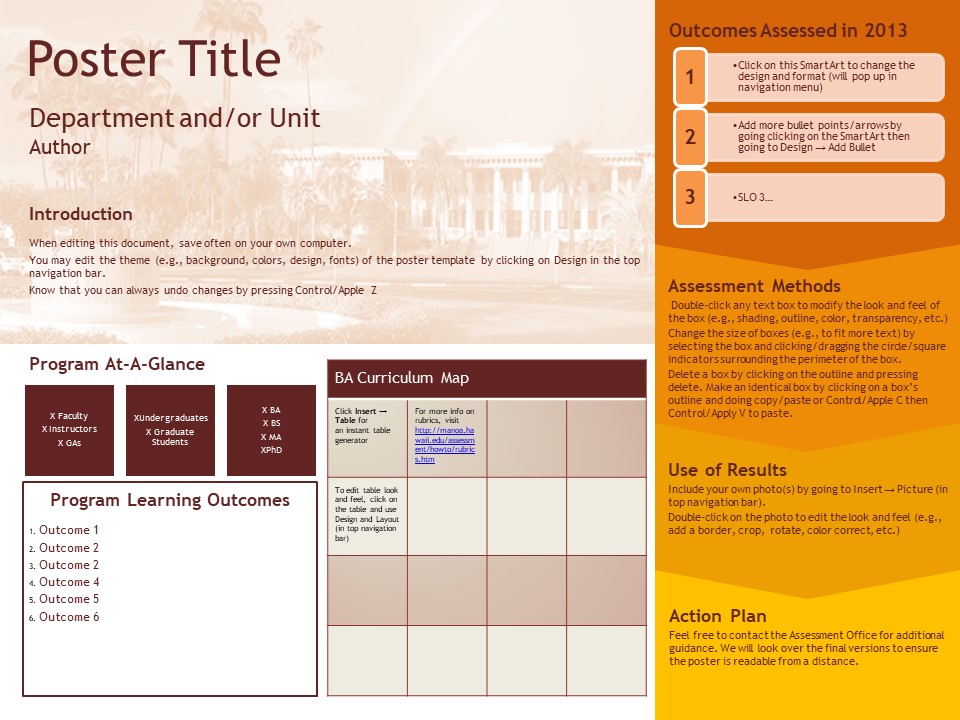April 5-9, 2021, online
On Friday, April 9th, 2021, the Assessment and Curriculum Support Center hosted 90 attendees and 18 awesome assessment posters from five Hawaiʻi institutions at the 8th Assessment for Curricular Improvement Poster Exhibit. Interim Associate Vice Chancellor for Academic Affairs Laura Lyons gave a warm welcome to presenters and attendees to start us off. Then, attendees circulated through Zoom breakout rooms to visit with poster presenters and discuss program assessment for the purpose of improving student learning. The live Zoom session on Friday was the culminating event of this year’s exhibit, which also included an online poster gallery the week of April 5th that featured 20 posters about higher education assessment projects in Hawaiʻi.
View Poster Exhibit Evaluation Report.
Overall, the event was a great success, and the Assessment and Curriculum Support Center would like to thank everyone involved for being part of this year’s virtual event. We congratulate the following poster award winners:
Poster Awards
Best Poster Design:
- Jamie Sickel & Kara Plamann Wagoner (Center for Excellence in Learning, Teaching and Technology, Kapi‘olani Community College): Integrated Planning for Student Success: Kapi‘olani Community College’s Continuous Improvement Journey
- Runners-Up:
- Dorothy Hirata, Laura Chuang, Matt Parcon, Alice Swift, and Marisa Yamada (Information Technology Services, University of Hawaiʻi): UH Online 5-Week Professional Development (PD) Program Evaluation and Iterative Improvements
- Sandra von Doetinchem (Outreach College, Continuing & Professional Programs, University of Hawaiʻi at Mānoa): Incorporating Learning Outcome Assessments into Noncredit Education: A Novel Approach
- Kacie Ho, Soojin Jun, and Yong Li (Human Nutrition, Food and Animal Sciences, University of Hawaiʻi at Mānoa): Assessing Written Communication Skills across Food Science Courses with a Common Rubric
Best Use of Assessment for Improvement (3-way tie):
- Richard Rath & Ulla Hasager (Ethnic Studies, University of Hawaiʻi at Mānoa): Assessing Civic and Community Engagement in Ethnic Studies
- Howard Shen, Edward McAssey, and Michael Muszynski (School of Life Sciences, University of Hawaiʻi at Mānoa): Establishing an Assessment Plan for the Undergraduate Molecular and Cell Biology Curriculum to Achieve Program Permanence at UHM
- Jamie Sickel & Kara Plamann Wagoner (Center for Excellence in Learning, Teaching and Technology, Kapi‘olani Community College): Integrated Planning for Student Success: Kapi‘olani Community College’s Continuous Improvement Journey
- Runners-Up:
- Haidan Wang, Song Jiang, Li Jiang, and Ming-Bao Yue (East Asian Languages & Literatures, University of Hawaiʻi at Mānoa): Creating a Rubric of Critical Thinking for Writing Intensive Courses
- MB Ogawa (Information and Computer Sciences, University of Hawaiʻi at Mānoa): Curricular Assessment for Improved Sequenced Learning
Best Faculty Engagement Strategies (2-way tie):
- Richard Rath & Ulla Hasager (Ethnic Studies, University of Hawaiʻi at Mānoa): Assessing Civic and Community Engagement in Ethnic Studies
- Jamie Sickel & Kara Plamann Wagoner (Center for Excellence in Learning, Teaching and Technology, Kapi‘olani Community College): Integrated Planning for Student Success: Kapi‘olani Community College’s Continuous Improvement Journey
- Runners-Up:
- Dustin Crowther, Betsy Gilliland, Kenton Harsch, Daniel Isbell, and Cari Gochenouer (Second Language Studies, University of Hawaiʻi at Mānoa): Oral Communication for Language Teachers: Assessment Rubric Development
Arai, Meiko (Center for Teaching and Learning, Chaminade University) – The Road to Institutional Effectiveness: Cultivating Partnerships for General Education Assessment
Brown, Shana (History, University of Hawaiʻi at Mānoa) – Capstone Signature Assignment Development in a History BA Program
Chang, Cara; Mahi, Michelle; and Nakamitsu, Kazuko (Language Arts, Leeward Community College) – Assessment across the Disciplines: Increasing Faculty Engagement in Assessment
Crowther, Dustin; Gilliland, Betsy; Harsch, Kenton; Isbell, Daniel; and Gochenouer, Cari (Second Language Studies, University of Hawaiʻi at Mānoa) – Oral Communication for Language Teachers: Assessment Rubric Development
Das, Priyam (Urban and Regional Planning, University of Hawaiʻi at Mānoa) – Assessing the Planning Practicum: Lessons for Engaged Scholarship
Drexel, April AH; Ka’aloa, Piʻilani; OʻNeill Keawe, Lia; and Long, Keahiahi (Hawaiʻinuiākea/Hawaiian Studies, University of Hawaiʻi at Mānoa) – Kumu, Kuleana, Kaona: Assessing Multiple Viewpoints
Gochenouer, Cari and Beaule, Christine (General Education Office, University of Hawaiʻi at Mānoa) – Strength in Numbers: Facilitating Faculty Learning Communities for General Education Student Learning Outcomes Assessment
Hirata, Dorothy; Chuang, Laura; Parcon, Matt; Swift, Alice; and Yamada, Marisa (Information Technology Services, University of Hawaiʻi) – UH Online 5-Week Professional Development (PD) Program Evaluation and Iterative Improvements
Ho, Kacie; Jun, Soojin; and Li, Yong (Human Nutrition, Food and Animal Sciences, University of Hawaiʻi at Mānoa) – Assessing Written Communication Skills across Food Science Courses with a Common Rubric
Nakamatsu, Nicole; Torigoe, Trevor; Mikami, Brandi; Thompson, Jesse D.; Rettenmeier, Christopher; Lozanoff, Beth K.; Kaya, Brock; Smith, Alice; Lee, U-Young; Aytac, Gunes; and Lozanoff, Scott K. (Anatomy, Biochemistry & Physiology, John A. Burns School of Medicine, University of Hawaiʻi at Mānoa) – Cross-Cultural Classroom: Assessing Student Opinion of Online, Case-Based Learning Modules, Utilizing MRI and XR Technology, in American and Turkish Medical Students
Ogawa, MB (Information and Computer Sciences, University of Hawaiʻi at Mānoa) – Curricular Assessment for Improved Sequenced Learning
Pagkalinawan, Leticia (Indo-Pacific Languages and Literatures, University of Hawaiʻi at Mānoa) – Development of a Signature Assignment in Filipino Cultural Courses
Rath, Richard and Hasager, Ulla (Ethnic Studies, University of Hawaiʻi at Mānoa) – Assessing Civic and Community Engagement in Ethnic Studies
Shen, Howard C.; McAssey, Edward; and Muszynski, Michael G. (School of Life Sciences, University of Hawaiʻi at Mānoa) – Establishing an Assessment Plan for the Undergraduate Molecular and Cell Biology Curriculum to Achieve Program Permanence at UHM
Sickel, Jamie and Plamann Wagoner, Kara (Center for Excellence in Learning, Teaching and Technology, Kapi‘olani Community College) – Integrated Planning for Student Success: Kapi‘olani Community College’s Continuous Improvement Journey
Stephens-Chu, Maura; Hill, Yao Z.; Aune, Krystyna; and Maeda, Julienne (Assessment and Curriculum Support Center & Graduate Division, University of Hawaiʻi at Mānoa) – Advanced Degree Institutional Learning Achievement Investigation: Methods and Opportunities for Action
Stopa, Justin E.; Cheung, Kwok Fai; and Nosal, Eva-Marie (Ocean and Resources Engineering, University of Hawaiʻi at Mānoa) – Automation of Student Learning Assessment for the Accreditation Board for Engineering and Technology (ABET)
von Doetinchem, Sandra (Outreach College, Continuing & Professional Programs, University of Hawaiʻi at Mānoa) – Incorporating Learning Outcome Assessments into Noncredit Education: A Novel Approach
Walguarnery, Justin; Morden, Clifford; and Drake, Donald (School of Life Sciences, University of Hawaiʻi at Mānoa) – Life Sciences Uniting in Assessing Student Writing
Wang, Haidan; Jiang, Song; Jiang, Li; and Yue, Ming-Bao (East Asian Languages & Literatures, University of Hawaiʻi at Mānoa) – Creating a Rubric of Critical Thinking for Writing Intensive Courses
View past posters in our archive here.
Since 2009, the Assessment for Curricular Improvement Poster Exhibit has featured faculty and staff in higher education using program-level learning assessment to improve student learning and programs. (View previous posters.) Join us in 2021 to
- share successful assessment strategies
- gather ideas for curricular and co-curricular assessment
- network with colleagues.
Who attends the Poster Exhibit? Faculty, staff, and administrators interested in learning assessment for improvement.
Cost? No fee. Free to presenters and attendees.
Poster Exhibit format
- April 5-9, 2021: Online viewing of posters and presenter video presentations
- April 9, 2021, 12:30-1:45 PM: Online, live discussion with presenters via Zoom
- 12:30-12:40 – Welcome message
- 12:40-1:40 – Poster viewing in Zoom breakout rooms
- 1:40-1:45 – Concluding remarks, door prize and evaluation information (win a book on teaching, learning, assessment)
Presenter Instructions and Help
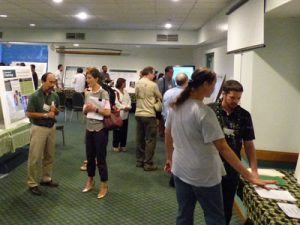
Instructions to Poster Presenters
- Complete the poster presentation signup form by Feb. 16. Information needed:
- Contact information for presenter and co-presenters
- Poster title
- Poster abstract of 50-150 words
- Confirmation that you or a representative will attend the Friday, April 9, 2021, 12:30-1:45 PM live Zoom discussion
- Consent or decline to have your poster published in UHM’s ScholarSpace repository.
- Help is available. See below for poster templates, tips, and assistance recording a video presentation. Or, feel free to contact us at airo@hawaii.edu for help with content, design, or technical issues.
- Submit a PDF version of your poster to airo@hawaii.edu by Friday, March 12, 2021.
- Optional: submit a 2-5 minute video recording of your presentation to airo@hawaii.edu by Friday, March 12, 2021.
- Engage with attendees at the live Zoom meeting on Friday, April 9, 2021, 12:30-1:45 PM
Poster Evaluation Criteria
1. Poster Design Quality
| 4 | Wow! Exceptionally attractive in design, layout, and neatness. The design enhances the content and represents a clear flow of the content. The font size and typeface intentionally signal main and subordinate points/messages and are very easy to read. Graphics (if used) easily and quickly convey the meaning. |
| 3 | Good. Design, layout, and neatness help the viewer understand the content. The font size and typeface are appropriately sized for easy reading from a distance. Graphics (if used) convey the meaning, with the help of the text. |
| 2 | Okay. Design, layout, font are perfunctory and do not help or hinder the message. |
| 1 | Umm… Design, layout, font hinder the message. For example, design is cluttered or illogical, layout is confusing, too much text, font size is too small to read. |
2. Use of Assessment for Improvement
| 4 | Wow! A group of faculty members (or other stakeholders) collaborated to use an assessment process or the assessment results directly and intentionally for the purpose of improvement (of student learning, the curriculum, resource allocation, policies, assessment processes themselves). They implemented the assessment process, engaged in critical reflection, and used the process and/or assessment results to logically inform changes. Bonus points to posters in which a follow-up assessment project was conducted to examine the effectiveness of the changes made. |
| 3 | Good. Assessment for improvement because the faculty (or other stakeholders) made changes that were informed by assessment processes and/or results. |
| 2 | Okay. The faculty (or other stakeholders) discussed possible actions but no clear action has been taken —OR— the faculty made changes but it’s not clear how the actions are tied to the assessment process/results. |
| 1 | Umm… The project focuses on the assessment process or results itself without reflection/discussion/use of the process/results for improvement actions. |
3. Faculty Engagement Strategies
(a good assessment process is collaborative)
| 4 | Wow! The strategies to engage faculty (or other stakeholders) are really working. Faculty/stakeholders participate in assessment-related activities. They appear involved with an assessment-for-improvement process through their regular participation and ongoing attention to curriculum effectiveness and student learning at the program or institution level. |
| 3 | Good. Engagement strategies were used because faculty (or other stakeholders) did participate in at least one assessment-related activity aimed at the program/institution level. |
| 2 | Okay. The strategies appear to have engaged a few committed folks, but it’s unclear if participation is widespread and if faculty regularly attend to learning and curriculum development at the program/institution level as a result of the strategies. |
| 1 | Umm… It seems to be a project primarily done by one person without participation/engagement from other faculty members. |
Poster Content Considerations
| Have a clear theme and organization | A program’s assessment efforts may include many accomplishments. Focus on a central theme/problem/project and organize the content to enhance the take-away message. |
| Content is useful for audience | Whenever possible, describe the processes, strategies, and tools that others may adapt/adopt. Attendees also appreciate knowing the challenges faced in the assessment project and (possible) solutions. |
| Focus on assessment-for-improvement | A primary goal of assessment is program and student learning improvement. Describe the action(s) that the program took in response to the assessment findings or challenges encountered (e.g., redesigning assignments, changing pre-requisites, refining advising practice, increasing faculty collaboration and collegiality). If possible, include the impact on student learning after the program took the action(s). |
Strategies and Tutorials to Create Effective Posters & Presentations
- For tips and tools for designing an engaging poster, please review our Best Strategies to Create Effective Posters.
- For instructions on how to record a poster presentation using Zoom, please see our tutorial video.
- For tips on how to create an effective bar chart to display assessment results, please see our tutorial video.
- For creating timelines using Canva.com, please see our tutorial document.
Poster Templates
Please feel free to use the following letter-sized (11″ width x 8.5″ height) templates to create your virtual poster (PowerPoint Slide/Google Slide).
To produce posters for printing (52″ width x 38″ height), please use templates here.
Suggested Poster Content
- Basic program information such as the number of faculty and students, degree(s) offered, and number of graduates per year
- Context of the assessment project: program learning assessment status/history of assessment in your program
- Description of the assessment project: useful tips, strategies, tools, steps in the process, end products, etc.
- Highlight how your program used assessment processes/findings for improvement
- Summary of accomplishments, lessons, strategies/tools to share
- Acknowledgements–assessment is a team sport
Sample Topics and Past Presenters
- Use of assessment results for curricular improvement
- Curriculum mapping and its role in program assessment and improvement
- Development and use of a rubric for program assessment
- Capstone portfolio assessment for curricular improvement
- For more examples, see posters from the 2019 exhibit.
Best Poster Design
- Sheri Fong & Vanessa Wong, John A. Burns School of Medicine (JABSOM) Content Maps of Health Care Problems in the Pre-clerkship Curriculum: Monitoring Themes, Gaps, Redundancies and Accreditation Requirements
- Michael Guidry, Oceanography & Yao Hill, Assessment Office Improving Oral Communication of Undergraduate Research Results
- Ryan Kurasaki, Molecular Biosciences & BioEngineering Scaffolding and Assessing Engineering Design: Effecting Program Change from Course Innovations
Best Faculty Engagement Strategies
- Wayne Buente, Ji Young Kim, Kelly Bergstrom, Patricia Buskirk, Hanae Kramer, Marc Moody, Rachel Neo, Scott Schimmel, Communications & Yao Hill, Assessment Office Advancing Learning in the Communication BA through ePortfolios
- Celia Smith & Judy Lemus, Marine Biology Revising the oral comprehensive exam in the UHM Marine Biology Graduate Program
Best Use of Assessment for Improvement
- Michael Guidry, Oceanography & Yao Hill, Assessment Office Improving Oral Communication of Undergraduate Research Results
- Ryan Kurasaki, Molecular Biosciences & BioEngineering Scaffolding and Assessing Engineering Design: Effecting Program Change from Course Innovations

